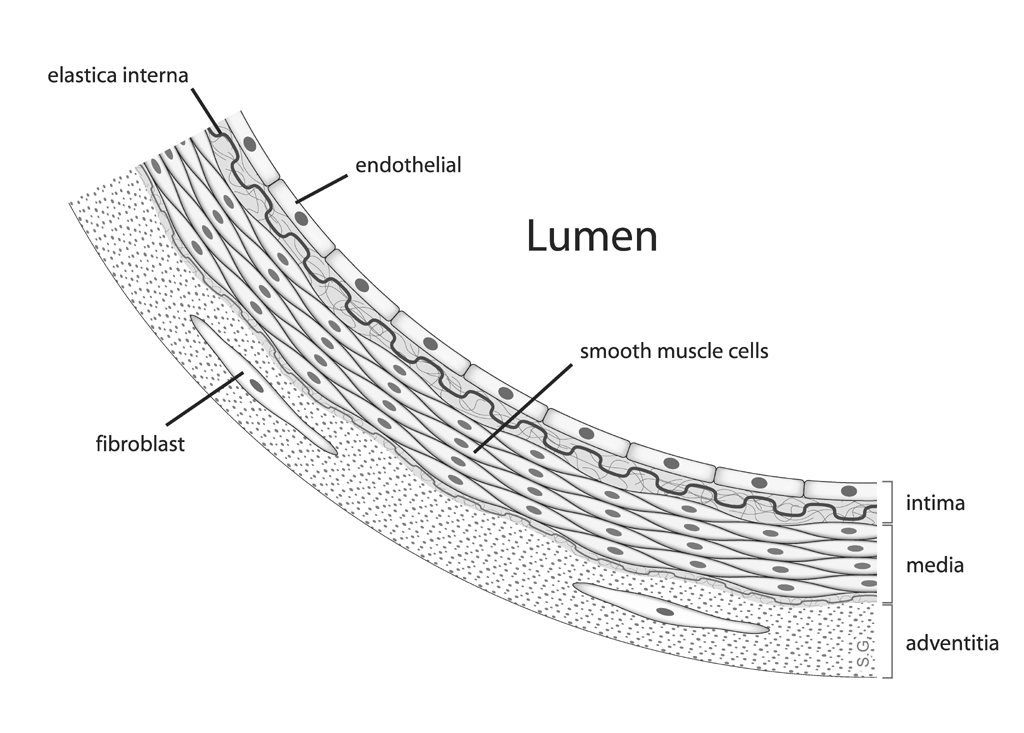Een hoge magnesium-inname met de voeding houdt verband met minder ontstekingsreacties en een betere endotheelfunctie, volgens een Amerikaanse studie6
.
Endotheel is een bedekkend laagje cellen dat de binnenkant van sommige organen of holten bekleedt, zoals hart en bloedvaten.
Tekening: doorsnede van een wand van een bloedvat:

http://www.ortho.nl/orthomoleculaire-bibliotheek/7133/minder-ontstekingen-met-magnesium
De Amerikaanse wetenschappers deden onderzoek onder bijna 4.000 postmenopausale vrouwen tussen 50 en 80 jaar oud.
Door middel van een vragenlijst werd de magnesiuminname via de voeding vastgesteld. In het bloed van de proefpersonen werden de concentraties van verschillende biomarkers voor ontstekingsreacties en endothele disfunctie vastgesteld: CRP, interleukine 6 (IL-6), tumor necrose factor alfa receptor 2 (TNF-alpha-R2), oplosbaar intercellulair adhesie molecuul-1 (sICAM-1), oplosbaar vasculair cel adhesie molecuul-1 (sVCAM-1) en E-selectine.
Een hoge magnesiuminname liet gunstige effecten zien op genoemde parameters, wat duidt op minder ontstekingsreacties en een betere endotheelfunctie bij postmenopausale vrouwen.
Bron:
Chacko SA, Song Y, [..], Liu S. Relations of dietary magnesium intake to biomarkers of inflammation and endothelial dysfunction in an ethnically diverse cohort of postmenopausal women. Diabetes Care 2010; 33(2):304-10
Het bron-artikel opPubmed: met meer details.
Diabetes Care. 2010 Feb;33(2):304-10. Epub 2009 Nov 10.
Relations of dietary magnesium intake to biomarkers of inflammation and endothelial dysfunction in an ethnically diverse cohort of postmenopausal women.
Chacko SA, Song Y, Nathan L, Tinker L, de Boer IH, Tylavsky F, Wallace R, Liu S.
Department of Epidemiology and Program on Genomics and Nutrition, School of Public Health, and Center for Metabolic Diseases Prevention, UCLA, Los Angeles, California, USA.
Abstract
OBJECTIVE: Although magnesium may favorably affect metabolic outcomes, few studies have investigated the role of magnesium intake in systemic inflammation and endothelial dysfunction in humans.
RESEARCH DESIGN AND METHODS:
Among 3,713 postmenopausal women aged 50-79 years in the Women’s Health Initiative Observational Study and free of cardiovascular disease, cancer, and diabetes at baseline, we measured plasma concentrations of high-sensitivity C-reactive protein (hs-CRP), interleukin-6 (IL-6), turnor necrosis factor-alpha receptor 2 (TNF-alpha-R2), soluble intercellular adhesion molecule-1 (sICAM-1), soluble vascular cell adhesion molecule-1 (sVCAM-1), and E-selectin.
Magnesium intake was assessed using a semiquantitative food frequency questionnaire.
RESULTS: After adjustment for age, ethnicity, clinical center, time of blood draw, smoking, alcohol, physical activity, energy intake, BMI, and diabetes status, magnesium intake was inversely associated with hs-CRP (P for linear trend = 0.003), IL-6 (P < 0.0001), TNF-alpha-R2 (P = 0.0006), and sVCAM-1 (P = 0.06). Similar findings remained after further adjustment for dietary fiber, fruit, vegetables, folate, and saturated and trans fat intake.
Multivariable-adjusted geometric means across increasing quintiles of magnesium intake were 3.08, 2.63, 2.31, 2.53, and 2.16 mg/l for hs-CRP (P = 0.005); 2.91, 2.63, 2.45, 2.27, and 2.26 pg/ml for IL-6 (P = 0.0005); and 707, 681, 673, 671, and 656 ng/ml for sVCAM-1 (P = 0.04).
An increase of 100 mg/day magnesium was inversely associated with hs-CRP (-0.23 mg/l +/- 0.07; P = 0.002), IL-6 (-0.14 +/- 0.05 pg/ml; P = 0.004), TNF-alpha-R2 (-0.04 +/- 0.02 pg/ml; P = 0.06), and sVCAM-1 (-0.04 +/- 0.02 ng/ml; P = 0.07).
No significant ethnic differences were observed.
CONCLUSIONS: High magnesium intake is associated with lower concentrations of certain markers of systemic inflammation and endothelial dysfunction in postmenopausal women.
PMID: 19903755 [PubMed - indexed for MEDLINE]PMCID: PMC2809271 [Available on 2011/2/1]Free Article

